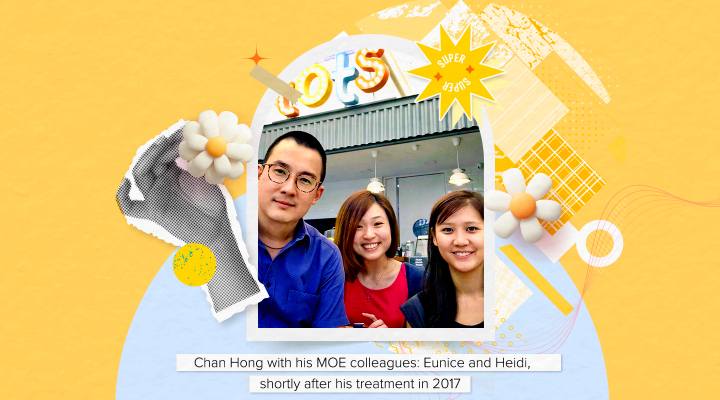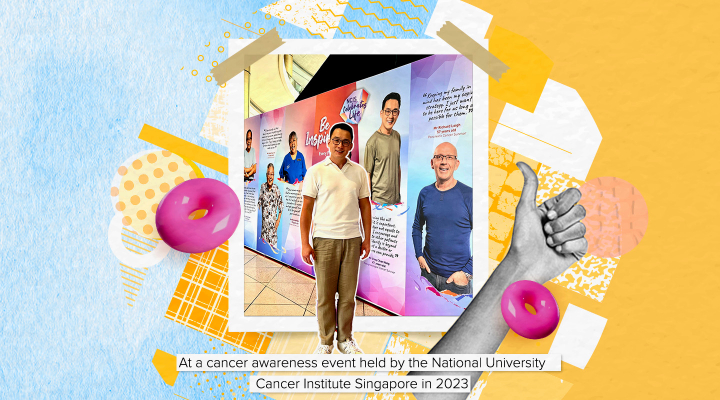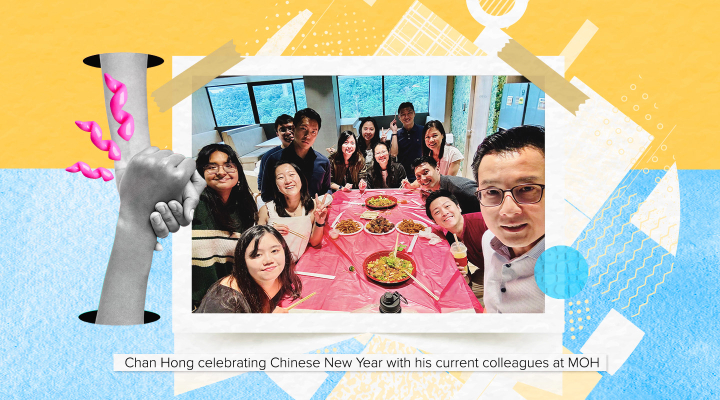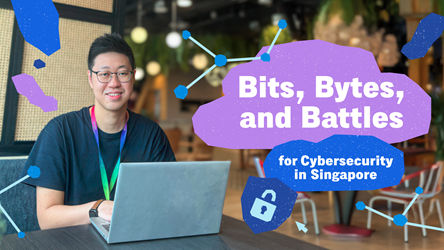As Told By A Cancer Survivor: Why The Simplest Actions Matter

We’ve heard stories of how people have survived cancer and thought, “I’m fit and healthy; it would probably never happen to me.” That’s what Choy Chan Hong believed until he was diagnosed with cancer in May 2017.
After finding blood in his saliva, Chan Hong visited a clinic, where his case was quickly referred to a specialist at a hospital. A biopsy later revealed that he had Stage 4 nasopharyngeal cancer, commonly known as nose cancer.
The news was a big blow to Chan Hong, who was in his early 40s and considered himself fit and healthy. “Naturally, for anyone who is active and healthy, it’s a shock because you never think it will happen to you.”
While he was in denial about his cancer diagnosis, Chan Hong knew he had to break the devastating news to his family and colleagues. He understood that the treatment process would be difficult and significantly impact both his family and work life, and he wanted to offer some reassurance.
At home, he was thankful that his family members were able to manage the situation positively and support him well. His two teenage sons were able to understand his diagnosis and, according to Chan Hong, viewed the news “objectively.”
At the workplace, he received quite a startling reaction initially from his colleagues at the Ministry of Education (MOE) Headquarters. “I could sense a level of surprise and shock,” he said, adding that it might be because he was considered young to be a cancer patient. On top of that, conversations about cancer are not common in our society, especially in the workplace.
Nonetheless, Chan Hong’s colleagues took the news in stride and redirected their focus to supporting him during his recovery.
Taking the Bullet for One Another

Like many public officers, work was a priority to Chan Hong. In fact, this was his main concern upon sharing his diagnosis: What would work be like? How would it all pan out?
Chan Hong shared that according to his patient care plan to treat the Stage 4 cancer, he would have to undergo aggressive treatment for four months, followed by at least two months of recovery. This meant that he could not perform his duties as usual for a total of six months.
To address his concerns, Chan Hong was offered the option to work from home during the early part of the treatment—a rare arrangement in 2017—which he gratefully accepted. “The team was very accommodating to give me the chance to work from home so that I can still contribute to the team while balancing with my treatment, and I’m thankful for that.”
Prior to his diagnosis, the thought of being off duty was a nightmare for Chan Hong. Little did he know that during this tumultuous period, there was a silver lining: a supportive team of colleagues who provided him with peace of mind as he focused on his recovery.
“The fact was that I was not disturbed (during my recovery) meant that someone would have taken the bullet for me, so I’m thankful that during the whole period when I was on extended sick leave, there was nothing that made me worry about work,” he shared.
Upon completing his treatment and recovery, Chan Hong received the all-clear to return to work as usual, but it was not without a little apprehensiveness.
“At that point, there was some inward resistance, because my appearance had changed. You go back to work; the whole world will know that you have gone through a terrible illness.”
While some teams may have organised a welcome-back party for their colleagues, that was not the case for Chan Hong.

Despite the aggressive treatment that had left him lethargic, he was thankful for his colleagues who had kept the work going, while respecting his wishes to keep his return low-key, and giving him the space and time to find his rhythm to contribute to his workplace again.
Having a New Lease of Life

People say that our worldview changes after experiencing a life-and-death situation, and for Chan Hong, this prompted him to re-evaluate his life purpose and consider how he can give back to society.
The first step he took towards that goal was joining the One Heart Befriender Group, where cancer survivors like himself meet, befriend, and provide support to newly diagnosed cancer patients at hospitals.
“While doctors can provide the medical advice and nurses can provide immediate support, what the patients need is hope. Is there a life that they can look forward to five years later?”, explained Chan Hong.
It is difficult for many of us to truly understand and empathise with cancer survivors, as we lack firsthand experience in battling the disease. Chan Hong shares that telling his story helps to raise public awareness and guide patients through the recovery process.

His newfound purpose also led him to a new career path at the Ministry of Health (MOH) during the height of the COVID-19 pandemic in 2020. He initially joined the ministry under a three-month secondment, an initiative that called for volunteers across all ministries to support healthcare operations during that time and decided to stay on in a permanent role after his short stint.
The Simplest Acts of Care Are All They Need

Bringing up cancer in the workplace can feel out of the blue. If you know a colleague who has gone through a similar experience, you may unintentionally make them uncomfortable or put them in an awkward situation.
Chan Hong emphasises the importance of being understanding towards them, which can be achieved through simple actions such as easing their workload, being patient, and taking the initiative to offer help when needed.
Upon returning to work, Chan Hong also believes that there is no need for grand gestures or physical affection. “I don’t expect my colleagues to give me a hug because we are colleagues,” he shared with a laugh.
“When I need to be off work, I can go off in peace and when I come back, I am not disadvantaged. I still have my work assignment; I’m still assessed objectively and appraised fairly.”

Want to get more stories like this? Join our Telegram channel https://t.me/psdchallenge.
- POSTED ON
Jul 25, 2024
- TEXT BY
Jayme Teo
- PHOTOS BY
Mandy Ong









